This will be an “Ongoing” article, looking at the review as it progresses, analysing the activities and reporting observations. As such it is very likely some things may change, and issues and questions may be resolved or clarified.
As such, following the Background summary, each update will be listed by date and will detail observed changes and issues as they arise or are addressed.
Which means this article will likely get to be very long.
Background
What is The Cass Review?
In late 2020, NHS England announced a full review of healthcare options available to young people under 18 who are transgender, or who need help navigating their gender identity.
This was done as part of the Gender Dysphoria Clinical Programme which was launched in 2018 to review and update trans healthcare in England, and the Review follows on from a disastrous CQC report on the existing service, GIDS (Gender Identity Development Service) run by the Tavistock & Portman NHS Foundation Trust.
GIDS has long been the subject of criticism from within the trans community, as well as among parents & guardians of transgender young people – with issues ranging from excessively long wait times to access care, to highly inappropriate questioning during assessments. Some young people & parents who have experienced treatment under GIDS have likened the process to NHS mandated conversion therapy.
The review itself is supposed to be independent of the NHS, and the aim is stated as
“…to ensure that children and young people who are questioning their gender identity or experiencing gender dysphoria, and who need support from the NHS, receive a high standard of care that meets their needs and is safe, holistic and effective.”
Dr Hillary Cass, a retired paediatrician who worked at Great Ormond Street Hospital, and a former president of the Royal College of Paediatrics and Child Health, was asked by the NHS to oversee the review.
Controversy & Concerns from the start
The announcement that Dr Cass would be heading the review immediately became cause for concern among the UK trans community.
It was very quickly discovered that Dr Cass appeared to follow a number of trans hostile groups on her twitter account – groups that are actively working to dismantle trans rights in the UK and who frequently create and spread misinformation about trans people under the guise of feminism, women’s rights and child safeguarding.
This was followed by the discovery that Dr Cass did not appear to follow any LGBT+ or Trans groups, although this changed quickly after this was pointed out.
However, the fact remains that Dr Cass already appears to have had exposure to trans hostile groups and rhetoric prior to the appointment, and continues to follow these groups.
There has been no explanation from Dr Cass to date as to why this is the case, nor acknowledgement that it is a cause of concern by the trans community.
Activities Start
In January 2021 the review “went live” with a new Twitter account (@thecassreview), and an initial blog post on the NHS website briefly outlining activities over the previous months, and promising the review would be “transparent & inclusive”.
In April 2021, a dedicated website was launched to detail the aims and activities of the review. This can be found at https://cass.independent-review.uk/.
Initial Review – 19th April 2021
This is the date the website for the review went live, and at this point, I performed a quick review of the information available – which immediately threw up a number of potential issues and areas of concern.
Trans Exclusion
First and foremost, and most alarming, was that there are no transgender people involved in the review at a decision making or process review level, effectively making it cisgender run, cisgender led, and cisgender decided.
Once again we see transgender healthcare in the UK decided by cisgender people – a position common in the NHS.
Even worse, the website’s Governance page clearly stated under “Membership” that trans people were specifically excluded from this level of decision making – quite possibly an act of direct discrimination under EA2010.
The stated rationale behind this is that the governance group was advising on process, not outcomes.
However, the assumption for this rationale is a common one made by cisgender people – that because they are not transgender, they are unbiased and can provide a dispassionate, objective view.
This assumption is fundamentally, and fatally, flawed.
Excluding trans people from the decision making and review processes risk bias, assumptions and misconceptions that the cisgender governance group hold will go unchallenged.
Without challenge on cisgender assumptions, it is my opinion that this review will likely lead to another failed attempt at trans healthcare for young people in the UK.
You simply cannot know if your process is built on misconceptions or bias if you have no experience.
Next let’s look at the Governance board itself.
While the board is comprised on experts in various healthcare fields that may be applicable to the review – none of the board have any experience of transgender people or transgender healthcare.
And on top of that, of those board members that appear to have Twitter accounts, all of those that do appear to follow a number of trans hostile accounts.
So we have a process review board that excludes trans voices specifically, is comprised of cisgender people with no experiences of trans lives or healthcare, a number of which may be trans hostile – and no way to challenge any decisions made.
Already this isn’t looking particularly good, and despite protestations of “no predetermined outcomes” would seem to hint at precisely that.
There should be no decisions about trans people, without trans people directly involved. Nothing about us, without us.
If the Review is serious about building trust, transparency and inclusion, it needs to consider convening a trans advisory board, consisting of parents, young people and trans adults, with the remit of ensuring that the governance panel and review is conducted without cisgender bias and trans hostile intervention.
Principles
The Principles section needs to be addressed – however, this will be detailed later in this article, as again there are a number of observations that warrant a more detailed look and I was out of time for this quick review.
However, a very obvious omission would be a key principle to challenge the inbuilt bias that a cisgender identity is preferable to a transgender identity.
And one that jumps out immediately is the claim that there are “no predetermined outcomes”.
Experience tells me that any group that goes to great pains to repeatedly state this usually means that the outcome is already predetermined.
So, what else is there that causes concern? Unfortunately, far too much.
Contributing to the Review
This really needs a deeper look in itself, however, a few key things stand out.
This section details a desire for consensus building and facilitated discussion – which is all well and good.
But…
Stakeholders are identified as professionals, transgender young people, parents and other interested parties.
“Other interested parties” opens the door to trans hostile groups and people, and having trans adults excluded or marginalised as “other parties” limits an important aspect.
With no specific engagement or input by trans adults, the review lacks the perspective of people who were unable to access gender healthcare when young, and the lifelong impacts that caused.
It would be a fundamental failure in review to look at trans healthcare for young people in isolation without understanding the long term impacts the absence of such healthcare causes.
Another aspect in the Engagement Principles is that the review will be “Mindful of other research”.
The only other significant research in this area currently is by the Nuffield Council on Bioethics programme, and I suspect that this principle relates primarily to that.
It has been noted that the Nuffield research suffers from many of the same issues as this Review, as detailed by Dr Ruth Pearce and Dr Natacha Kennedy.
So that danger here is that because both reviews are trans exclusive, they will continue to perpetuate harm on the trans community by promoting cisgender ignorance and bias.
However, the clearest indicator that the Review fully intends to engage with trans hostile groups and individuals is found in the last part of the engagement principles.
It states :
“The Review will be informed through ongoing dialogue with a broad range of stakeholders. When conducting engagement activities, the Review team will acknowledge and allow expression of the different views and opinion across the spectrum of stakeholders, but will not tolerate disrespectful, threatening or abusive behaviour.”
The only groups and individuals that use “disrespectful, threatening or abusive behaviour” are those that are trans hostile.
We have to ask why such groups, who are clearly not stakeholders or service users, are being explicitly invited to have a say on healthcare for a group of people that they are actively working to eradicate? This turns the review into yet another debate and attack on trans lives.
After all, you wouldn’t ask anti-vaxxers to consult on vaccination programmes.
There needs to be a clear commitment from the Review to exclude trans hostile views and opinions, to prevent any outcomes being tainted.
Research
Until this actually starts we don’t really have much to go on.
However, this section references the recent NICE reviews, which are already known to be problematic.
For example, the review on GnRH analogues (known as puberty blockers) makes the fundamentally flawed assumption that their use alleviates gender dysphoria – which they do not. This is either a deliberate attempt by NICE and the NHS to provide “evidence” that PBs are not effective, or that it is simply an assumption made by an ignorant researcher that has not been picked up.
If it is the latter then the review needs to be conducted again. But many fear that the reason is the former, as evidenced by the comments stating that the NICE reviews “show weakness”.
Neither NICE, the NHS nor the Review has addressed this concern.
It also states the review will be working with GIDS in a research capacity. Yes, the same GIDS that has been shown to be thoroughly incompetent in both research (as evidenced by their handling at Bell vs Tavistock), and in providing “care”.
Latest – Dr Cass’ Blog
In another piece of evidence pointing to Dr Cass’ exposure to trans hostile views, Entry 2 cites misinformation around desistance as if it is fact -“First off, it is important to say that many young people who question their gender identity do not need any help from the NHS”, and claims to be tapping into “first-hand expertise” but is not engaging with trans charities, services or trans adults – omitting a substantial body of actual first-hand expertise.
Scope Review – 1st May 2021
Let’s look at the “Scope” of the review in a bit more detail, which can be found under “Terms of Reference” on the website.
First off, again we have a reference to “all interested stakeholders”. This approach seriously needs to be reconsidered to exclude trans hostile views. They are not “stakeholders” in any sense of the word, and the only interest they have is in removing trans related healthcare.
While this remains a key policy and objective in the Review, it will remain under deep suspicion that it is nothing but a formalised excuse to remove care by the NHS. It demonstrates a complete lack of “good faith” and fundamentally erodes trust with those it needs to build it with.
Let’s look at the Scope itself.
1) It needs to be noted that there are no “local” services that deal with “gender incongruence” in existence currently, so either this is a simple display of ignorance and extremely poor wording, or a statement of intent – either way, the implications are disturbing.
What could that intent be?
A known, current issue young people experience is the “referral black hole” – GPs referring to local CAMHS (Child and Adolescent Mental Health Services) rather than GIDS. This is often used as a delaying tactic by GPs in preventing a trans young person from accessing care. So this may indicate a way of formalising a pathway into existing mental health services rather than a direct referral.
The wording around “less complex expressions” of gender incongruence is interesting and possibly misleading. Most trans people would regard “less complex expressions of GI” as those most likely to need specialist gender identity services quickly – not the other way around.
i.e. a young person whose experienced gender is binary and opposite to their ASAB, and presents from early age = “less complex”
It is possible that there is confusion here between gender non-conformity with gender incongruence – but if that’s the case then we are already off to a very rough start, and this could do with some serious clarification.
2) This is rather broad. Establishing clear referral criteria & pathways could be beneficial, i.e. if it includes the ability for self referral in the same way as the 2019 adult protocols.
However, this can also very easily be read as “let’s make it as restrictive as possible” – i.e. if the referral to a specialist gender identity service is the last step at the end of a chain referrals.
“referral criteria to other services” is an interesting addition that can also be read a number of ways. The most obvious would be in referring to endocrinologyendocrinology https://en.wikipedia.org/wiki/Endocrinology Endocrinology (from endocrine + -ology) is a branch of biology and medicine dealing with the endocrine system, its diseases, and its specific secretions known as hormones. It is also concerned with the integration of developmental events proliferation, growth, and differentiation, and the psychological or behavioral activities of metabolism, growth and development, tissue function, sleep, digestion, respiration, excretion, mood, stress, lactation, movement, reproduction, and sensory perception caused by hormones. Specializations include behavioral endocrinology[1][2][3] and comparative endocrinology. services, but could also possibly encompass referrals back to MH services rather than continuing care, i.e. for ASD / ADHD, which could lead to more delays.
3) This is good as an objective, but would be the end result of the whole process.
Clarity and understanding, provided it’s published, accessible and easy for services users & clinicians to understand the process is nothing but good.
4) This is an odd one, as it seems to be in direct conflict with 1) and 2) which can be interpreted as covering both simple and complex “presentations”
For example, Non-Binary identities could be considered to be complex presentations, which means that this could lead to a 2 tier system that preferences binary identities, and excludes Non-Binary identities – despite members of both groups possibly sharing the same needs on interventions and treatments on an individual basis.
It could also mean folks with ASD / ADHD or other mental health needs are defined as “complex”, likely leading to delays in care via the outdated, ableist assumptions that people with ASD / ADHD do not know who they are, or that ASD / ADHD causes gender incongruence.
This is another area where the Review really needs to add substantial clarity on what they mean by both “simple” and “complex” presentations.
5) An objective look at the wealth of evidence worldwide on the use of GnRH analogues (puberty blockers) would be good, and long overdue by the NHS.
Relying on the NICE reviews to do so, which are fundamentally flawed, is very, very bad.
Having clearly defined use/needs/outcomes of these interventions can only be good, assuming that these treatments are actually accessible and not gatekept to the same extent as currently.
6) Establishing data management and research needs is great – GIDS has been notoriously bad with all of this.
7) Likewise workforce requirements. But this will depend on assumptions made of need, driven by process.
One of the biggest failures of the NHS with trans healthcare is the lack of response to increasing demand. The current services appear to be designed to be “capacity” led, which has created huge waiting lists, coupled with zero interest in increasing capacity or revising restrictive processes in order to speed up assessments.
So if workforce requirements are tied to demand this could be beneficial. If the Review tries to scope service by defining a “capacity” in the same way the currency services were designed then it simply repeats current failures in the future.
8) CONTENT WARNING. The following contains a number of so-called “Gender Critical” dog whistles.
Investigation into an increase in referrals could potentially be beneficial in determining demand.
However – having a focus solely on trans masculine young people (listed here as “natal female”) buys into current GC tropes & misinformation around “protecting girls”.
The UK Government’s own LGBT survey shows a near parity between Trans Men and Trans Women as a percentage of the transgender population, but referrals to young people’s services have never reflected that parity. Focus on “natal females” in this area implies that the increase is an aberration – which opens the door for “Social Contagion”, “ROGD”, “Peer Pressure” and other standard cisgender misconceptions, assumptions and excuses for being transgender.
It is possible that the intent here is simply to address and debunk GC claims, but in the current climate coupled with the NHS attitude to trans healthcare, many find the likelihood of that to be somewhat remote.
This section also needs to look at why there has not been a concurrent increase in referrals for trans feminine young people, to determine if this in itself is an aberration caused by prevalent, misogynistic cultural attitudes that being feminine is negative, and a barrier to accessing care.
9) This is basically “Any Other Business”
Conclusions from Scope Review
Already there are a number of systemic, cisgender assumptions and biases present in the scope that could do with addressing and clarifying, as detailed above.
No 8) in particular may be a double-edged sword, and the focus on trans hostile concerns and wording here is a cause for concern that may hint at a preconceived outcome.
Broadly, every part of the scope could do with a lot of additional clarity & explanation – as it stands it is simply too vague and potentially misleading.
Update 1st May 2021
Let’s catch up as there have been some changes from the original overview on 19th April.
Most interestingly but entirely unsurprisingly, and despite claims of “transparency”, neither the changes nor the reasons for them have been detailed, but rather slipped under the radar in an apparent attempt to hide them.
It is customary when aiming for transparency to detail a log of all changes – something that has not been introduced, but the Review would do well to consider.
First off, the “Governance” section has been removed and replaced with “Assurance Group”.
This area previously detailed explicitly that trans people were excluded from the Governance process. As mentioned, it is suspected that may have been in direct contravention of EA2010 as an example of direct discrimination, and possibly removed due to this.
But the position of trans exclusion within the decision-making processes has not changed, which means that trans exclusion is now covert rather than overt.
The “Assurance Group” is supposed to “provide expert advice and challenge about the approach and processes used to conduct the review”, but previous points and concerns remain.
All members of this group are cisgender, so the approach remains biased because there is no mechanism for cisgender assumptions to be challenged.
The “Membership” section has been changed to “Assurance Group Membership”, but still excludes trans voices, and as such still excludes relevant first-hand expertise.
It remains a cisgender run, cisgender led, cisgender decided review that excludes trans people from decision making at all levels, which is fundamentally discriminatory, and a fatally flawed approach.
Blog Entry 3
Reading these is rapidly becoming enraging.
The tone is both condescending and patronising throughout – and this is consistent with previous entries. It may not be intentional, but it remains so regardless.
The main theme in this entry is “trust us” – displaying a fundamental lack of knowledge in why there is a trust gap between the trans community and the NHS.
Condescendingly, Dr Cass states that this process is “Anxiety provoking”, again displaying a fundamental lack of awareness of how the last 4 years or so in the UK have impacted trans people.
This review isn’t just “Anxiety provoking”, it represents an existential threat to the care and existence of young trans people that may have ramifications into adult trans healthcare & lives.
Website changes have been mentioned, but not any underlying reasons why they were needed, nor where they were applied.
Dr Cass talks about the Assurance Group being formed to help the review follow a “robust and inclusive process”, but fails to mention that trans people are excluded from the decision-making process, review board or assurance group – making a mockery of claims to be inclusive.
She also talks about “low expectations”. Again, this shows a fundamental failure to understand that the trans community dont have “low” but rather “negative” expectations of the outcome of this review – and there is nothing so far that would suggest we should anticipate otherwise.
Dr Cass asks for “confidence” and to expect “good faith” – again showing that Dr Cass has absolutely no understanding of how trans people, in general, have been treated by the medical community at large in the UK, or by the NHS specifically. She presumes a small “trust gap” exists between the trans community and the NHS / UK medical communities when the actuality is a “trust chasm” of Valles Marineris proportions.
Quite simply – The NHS & UK medical communities are not trusted by trans folks – in any capacity, and have repeatedly proved that they are untrustworthy.
It finishes with “I hope we will be able to find a way forward”.
Which, loosely translated given the evidence we have so far likely means ”we’re still excluding trans people, so you’re going to get what you’re given. We are completely uninterested in allowing cisgender assumptions to be challenged.”
This shows why trans voices are desperately needed in the processes and in decision making, as Dr Cass clearly doesn’t understand what is at stake here for trans people.
Update 11/5/21
Yesterday saw another update in the “Latest” section of the Cass Review, this time with Dr Cass writing to the NHS Director of Specialised Commissioning, John Stewart.
You can find this letter here: Letter to NHS England and NHS Improvement.
In brief, Dr Cass provides an update on a number of areas of the review, and provides some observations and suggestions about implementing interim changes to trans young people’s healthcare on the NHS.
Now usually, when we talk of interim solutions we do so in one of two scenarios – the middle steps of moving from one established model to a newly defined model, or incremental changes to an existing model to improve it in the short term while a new one is designed/built/tested.
These suggestions do neither, but rather attempt to design a new care model as an interim measure in itself. It’s an ill conceived approach that introduces more potential problems than it solves.
It’s also worth noting that the tone of this letter is markedly different to that used in previous entries.
Social media reaction appears to be generally positive, however I’d suggest that is premature. It is a mix of potential positives and pretty big negatives, and a likely confirmation that my suspicions of the Review having predetermined outcomes being true.
As usual, the devil is in the detail, and there’s a lot of devil to analyse here.
Commissioned Research Programme
Firstly, Dr Cass acknowledges that the NICE reviews for puberty blockers and HRT options are “not conclusive enough to inform policy decisions”. Unfortunately she does not elaborate on how, or why they are not conclusive. As mentioned in my initial review (19th April, Research) – the fundamental assumption made in the review for puberty blockers was erroneous in that it alleviates gender dysphoria – as we know, that is not the intent in their use, and they do not have that effect. It would be beneficial, help build trust, and provide a display of “good faith” if Dr Cass would elaborate on this point, as well as many others we have made in this ongoing article.
She goes on to state about exploring other methodologies and reviewing international models and data – and while not elaborating here, this is a potentially large positive, especially if the review engages with experts in Australia and the USA.
However…
She then goes on to reference the recent events regarding overturning part of Bell vs Tavistock, which allowed parents to consent to treatment using puberty blockers, and acknowledges that the legal actions have “further added to the service pressures”.
It is worth noting at this point that it took the NHS almost 3 weeks to provide the appearance of renewing treatment (after removing treatment callously within 24 hrs with no care plans for those on this treatment) – and even then, they replaced the need for a court order with a new, additional layer of gatekeeping via a “multi-disciplinary panel” in order to continue to deny treatment – something it is succeeding at, as to my knowledge no young people have yet resumed treatment with puberty blockers.
Rather than acknowledge that the NHS is failing to renew treatment, she instead applauds the placement of additional barriers to care in spite of the legal ruling requiring no such additional restrictions, and also fails to acknowledge that many of the “service pressures” at GIDS are entirely of their own making, then follows this up with excuses about staff vacancies, volume of referrals and waiting lists.
She then goes on to acknowledge that how GIDS is set up is, frankly, a failure – one based on the same false assumptions being used in the Review, that the prevalence of trans people is low – but also that primary care services have completely neglected to keep pace with knowledge and events – which as we know is in part a result of being allowed to do so by refusing to treat trans people in almost any capacity.
And I think the real aim here is – this is the “set up” for giving the appearance of reducing waiting lists in the interim. We’ll come back to that, because it becomes abundantly clear later.
Recommendations to NHS England and NHS Improvement
In this section, Dr Cass offers some considerations on “interim pathways”.
We’ve had the set up, here comes the body blow.
In “Access and Referral”, she recommends that direct referral to GIDS be removed under the guise of concern for delays in care due to a “lack of differentiation” – which basically means local services picking up on young people with dysphoria, as well as “other issues” or “complex needs”.
In “Assessment and Management” she recommends that this differentiation be done via a local multi-disciplinary assessment (I speculated in my initial review this would be via CAMHS – Child and Adolescent Mental Health Services) and the young person remain under that teams care until seen by GIDS. We’ll come back to that too, but to give Dr Cass credit, she does acknowledge that both this capacity, knowledge and capability currently does not exist.
But, she notes that building this capacity will lead to a “range of different models and options” – in effect introducing what would be a postcode lottery into a service already beset with major problems, and causing further confusion to service users, primary care providers and anyone else trying to work out what is going on.
This approach seems ill advised at best, and it would surely be better to develop a coordinated, consistent interim methodology / diagnostic assessment to avoid this.
In “Data” she recommends gathering “good quality data” – something that would indeed be beneficial moving forwards.
Actions for the Review Team
Meaning the Cass Review team. The same team with no experience in dealing with trans healthcare, and excludes trans people, are going to be trying to actually fix it.
In “Capacity” we indeed have confirmation that these “local teams” are indeed CAMHS. The same CAMHS teams that young people get fobbed off too by GPs who don’t want to refer young people to GIDS, the same teams that have 2+ year waiting lists themselves. She seems to be relying on some future “substantial investment” in CAMHS in order to deal with this. This would also appear to be a retrograde step, as its my understanding that prior to direct referral to GIDS being implemented, the referral went via CAMHS first – with those very same delays in care / long waiting lists being the end result. This was one of the reasons for switching to direct referral in the first place – so in effect, we are going backwards to a previous, failed model.
“Capability and Confidence” simply repeats that the CAMHS teams have no knowledge, training or experience, and that this needs to be addressed – but makes the (possibly partially true) observation that this is due to social polarisation and tension – meaning opposition from trans hostile elements. She makes no mention that this knowledge gap also exists because primary care providers often refuse to treat trans people, and the NHS allows them to get away with it.
“Lack of Assessment Framework” again details the need to develop a diagnostic assessment framework, and that GIDS are already approaching this – likely a cause for concern given their horrendous performance in this area to date.
This is followed by recommendations to set up / test working groups with “relevant professional groups” and service users to identify barriers and build this assessment framework, training plan and workforce recommendations, which all sounds good in building and supporting a move towards delivering some treatment in primary care settings rather than at GIDS – until you realise that we have no idea what groups she is referring to – i.e. would she consider TransgenderTrend or SafeSchools Alliance, both trans hostile and opposed to treating young trans people, to be such “relevant” groups?
So the Review team actions here would seem to consist of a facilitation / coordination role, rather than one of process creation. Which begs the question that given the Review team nor the Assurance Group have the relevant experience with trans people or healthcare – who is actually designing the process?
And it finishes finishes off with some indications of timelines etc for the Review itself.
Evidence of a “Predetermined Outcome”?
Ok, here comes what looks like the sucker punch.
What might be the desired, predetermined outcome?
I’d suggest that if you wanted to remove the appearance of long waiting lists for care at GIDS, and instead hide the true numbers under layers of multiple long waiting lists at numerous CAMHS services – this would be the way to do it. It’s the appearance of action, while just moving the problem around – rearranging the deckchairs on the GIDS Titanic.
I’d also suggest that if you already had a care model designed but didn’t want to admit that – this would be the way to start introducing it.
Let’s put some previous knowledge together to demonstrate that the key interim measure suggestion – moving initial diagnosis to CAMHS – is the likely result of this predetermined outcome – something Dr Cass has denied being used in the Review.
1) In her blog (Entry 2, 19th March), Dr Cass states : “First off, it is important to say that many young people who question their gender identity do not need any help from the NHS”. We know this to be an assumption with no evidence base, but it provides an excuse to move diagnosis back into the CAMHS black hole on the assumption that many don’t need GIDS services, but are instead self referring in error – and that is the cause of long waiting lists rather than archaic, badly designed and excessively rigid assessments that reinforce the gender binary and their accompanying stereotypes, as barriers to treatment.
2) In Scope, the first two entries talk about moving diagnostics and care into local, primary care settings only, as a desired objective from the outset. A review with no predetermined outcomes would be looking at all avenues to determine the best path, not limiting itself.
3) In this letter, Dr Cass recommends exactly these actions.
This shows pretty clearly that from the outset that this recommendation was likely predetermined.
It’s been telegraphed from the start, and proposed without any evidence or analysis provided that this is the best course of action. It seems to be more of a “final implementation” suggestion that is somewhat in line with the intended path for adult services instead. Which wouldnt necessarily be a bad thing, if the new localised services end up actually working.
But it hinges on a supposed “future substantial investment” in CAMHS – which I would suspect doesn’t actually exist, or more likely won’t be used in the way this letter supposes – something Dr Cass hints at herself by suggesting “close engagement” will be needed to actually make any of it happen – because its unplanned and unbudgeted additional work.
So, assuming this investment doesn’t happen, or isn’t applied – trans young people may well be be back to where they were prior to direct referral to GIDS being an option – having to navigate a hidden, long waiting list to negotiate an ill equipped, under funded local team with limited knowledge in order to secure a referral to specialist services.
In other words, more layers of delay and gatekeeping – which will have a knock on effect into adult services from young people unable to secure treatment or referral when they need it, placing adult care under even more strain.
This comes as a result of looking at child services in isolation, rather than as part of a larger, integrated system of trans healthcare.
The final point I want to make on this is that pushing this back into CAMHS is also contrary to the intentions of the ICD11 reclassification of Gender Incongruence from Mental Health to Sexual Health.
The NHS and Dr Cass seem to be determined to keep trans healthcare under the pathologising aegis of NHS mental health services, perpetuating stigma and the prevalent assumption that being trans is a mental illness – something as care providers they should be actively working to dismantle in line with current scientific knowledge, rather than encourage it. I’d also suggest that CAMHS is the last place this belongs, and a more fitting placement would be alongside new adult services.
We also have to ask why the assessment and diagnostic processes at GIDS are not being investigated as interim options for speeding up access to treatment, rather than an arcane, convoluted and patchwork mess of suggestions to move to local care / training etc – which would be a mammoth task to do nationally as a fully realised programme, let alone as interim measures.
These suggestions have the stench of panic and desperation to hide problems in a system that has, and continues to fail young people, rather than actually address the fundamental issues and failures plagueing the service.
Update 1/6/21
On May 26th 2021, Liz Truss made a statement in the House of Commons regarding the Cass Review in response to a question raised.
The response she made was short and to the point, stating clearly :
‘We want to make sure the under 18’s are protected from making irreversible decisions about their own future’
As anyone in the UK subjected to anti-trans rhetoric can tell you, this is the exact phraseology used by those who are actively trying to remove healthcare options from trans young people. That this has been done by a government minister, and as an unequivocal statement can be taken as evidence that the Cass Review is indeed operating to a set of predetermined outcomes.
I have written to the Cass Review to seek clarification on this, and several other points in relation to the letter to the NHS covered above.




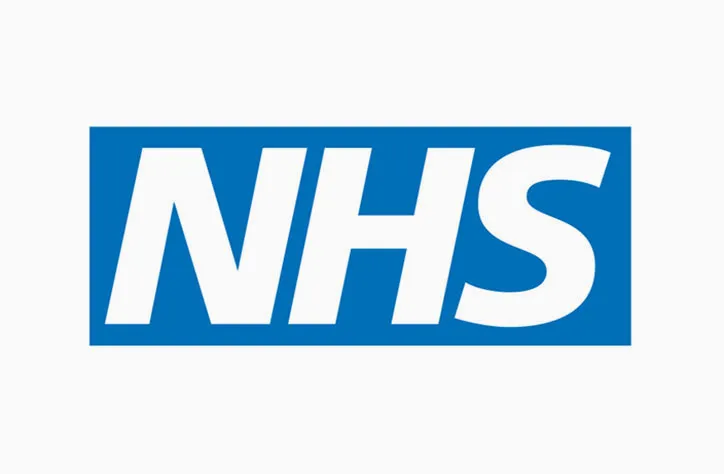
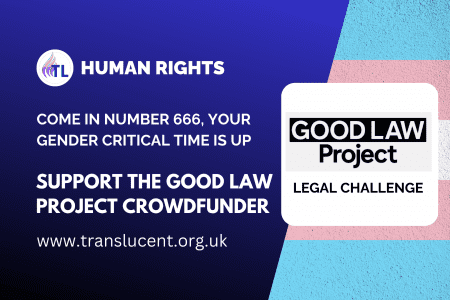
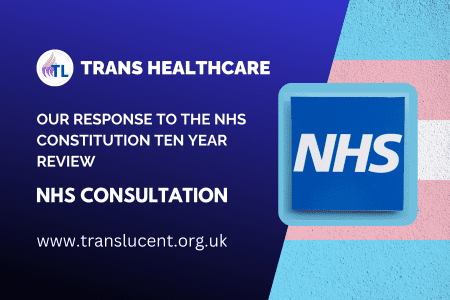
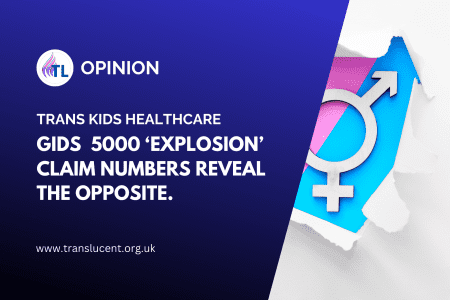
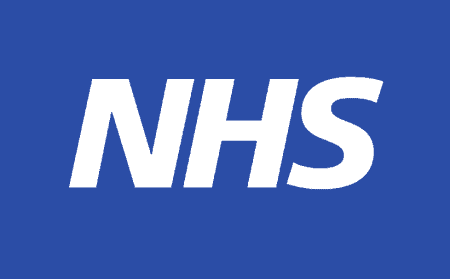
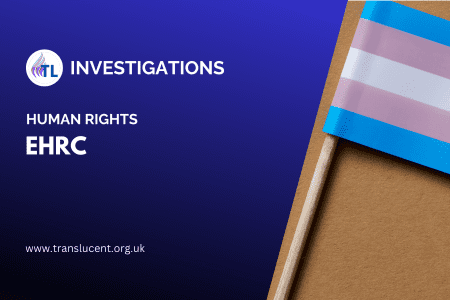
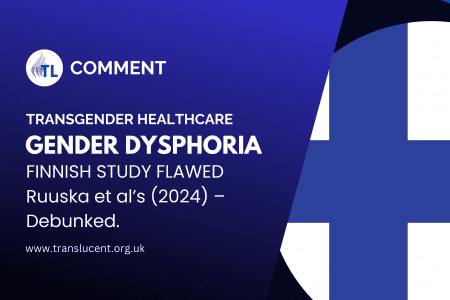
 To provide the best experiences, we use technologies like cookies to store and/or access device information. Consenting to these technologies will allow us to process data such as browsing behaviour or unique IDs on this site. Not consenting or withdrawing consent, may adversely affect certain features and functions.
To provide the best experiences, we use technologies like cookies to store and/or access device information. Consenting to these technologies will allow us to process data such as browsing behaviour or unique IDs on this site. Not consenting or withdrawing consent, may adversely affect certain features and functions.